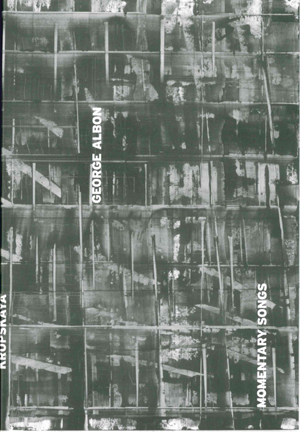George Albon
Momentary Songs

ISBN 978-1-92865-027-0
$14.00
94 pages
A moment is an inside flutter, a reflection, a civil relapse. George Albon’s Momentary Songs sound the possibilities of forwardness and hope in a surrounding twilight of unprecedented venality. Using a variety of registers—lyrical inquiry, Blakean exhortation, the satirical spiel of Morgenstern’s Gallows Songs—they search for alternative states (public ones, affective ones) as well as offer a probe on what has come to pass: “In this eclipse are we the inclement for placing it?”
A reading pole can also be a door, a tree trunk, the wall of a barn. It’s the itinerant’s edge-of-town bulletin board, where shared message-symbols are drawn and heeded: Good town, bad town, okay place to stay, don’t stop here. The poems of Reading Pole both comment on and embody the heart of these messages—quick news on the open-ended route.
In Dorothea Tanning’s Eine Kleine Nachtmusik, an enormous sunflower lays across an upper floor landing. A pubescent girl with undone blouse leans against the landing’s wall, enduring an experience, or savoring one. Another girl, her back to the viewer, looks down the hallway, her long tresses freed from gravity and tendriling toward the ceiling. Sunflowers will do that.
Seven Admissions offer variations on a name, and revel in the world between the letters. Inspired by Frank O’Hara’s acrostic-poems to Edwin Denby, these admissions are playful and austere by turns, but always putting forth Eros as challenge to the death-making predicates of the title sequence.
“Avuncular spotted drones,” be warned. Not since Guston did Nixon has the resource of art been turned on the throne with such hopeful scurrility. Albon’s Momentary Songs are hymns for the unchurched “pioneers/of the bottom edge,” who know “all midnights are false” and want back their stars. I’m taking my news from the other George—resistance isn’t futile, it’s the “sunlight is information” age and Minerva’s owl sings “coup due.”
>
--Rodney Koeneke
One might echo Walter Benjamin on Karl Kraus: "The very term 'public opinion' outrages him. Opinions are a private matter. The public has an interest only in judgments." The title sequence of Albon's tough and tensile new collection, Momentary Songs, might surprise readers accustomed to the quiet, deliberate insistence with which his work has gathered itself into place over the years. This is an Albon committed to the clamor of a public occasion, revealing how large has been the imagination guiding his work all along, had we only listened. Albon takes up Kraus's struggle (minus, thankfully, its flirtation with reaction) within a horizon of "opinion" immeasurably broadened, as our current machines of public chatter threaten to level discourse as a whole into information, and pulverize that information into noise. Not content to retreat from this scene into the contemplative chambers in which the business of our politics consoles itself, neither do these lyrics adopt the fashionable stance which would hope to overcome the stultifying noise by amplifying it back to itself in a feedback loop of hip futility. What's at work--and what works--here, is a granular method locating edges of articulation among the turns of phrase of our shared unconsciousness, recovering Albon's larger project of the deliberate by bringing words to their moment of deliberation--often in startling outbursts of rhyme, in which are felt a deep historical current of poetry as that which refuses simply to inform, but must sound. Kraus: "How noisy everything grows." Albon: "But that was not a document, just a temporary air disturbance."
--Taylor Brady
George Albon is the author of Empire Life (Littoral Books), Thousands Count Out Loud (lyric& press), Brief Capital of Disturbances (Omnidawn), and Step (The Post-Apollo Press). Chapbooks include King (Meow Press), Transit Rock (Duration Press), and Reading Pole (Seeing Eye Books). His work has appeared in Hambone, New American Writing, O Anthology 4, Avec Sampler 1, The New Review of Literature, and the anthologies The Gertrude Stein Awards in Innovative American Poetry, Bay Poetics, and Blood and Tears: Poems for Matthew Shepard. His essay “The Paradise of Meaning” was the George Oppen Memorial Lecture for 2002. He lives and works in San Francisco.